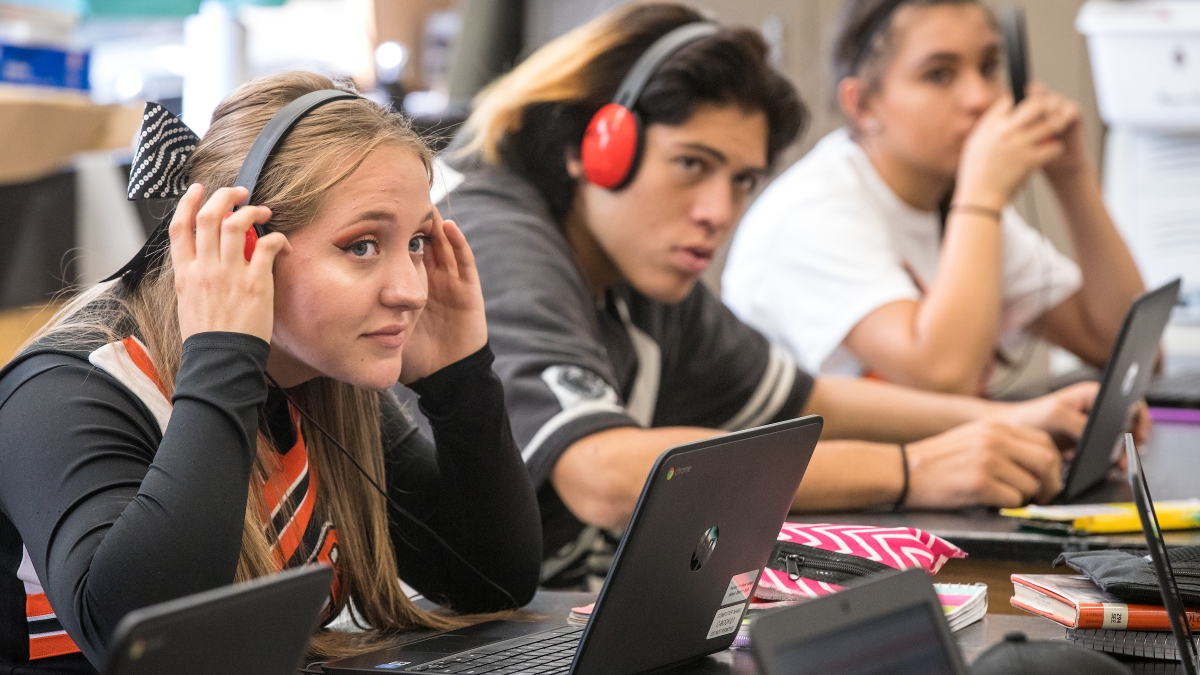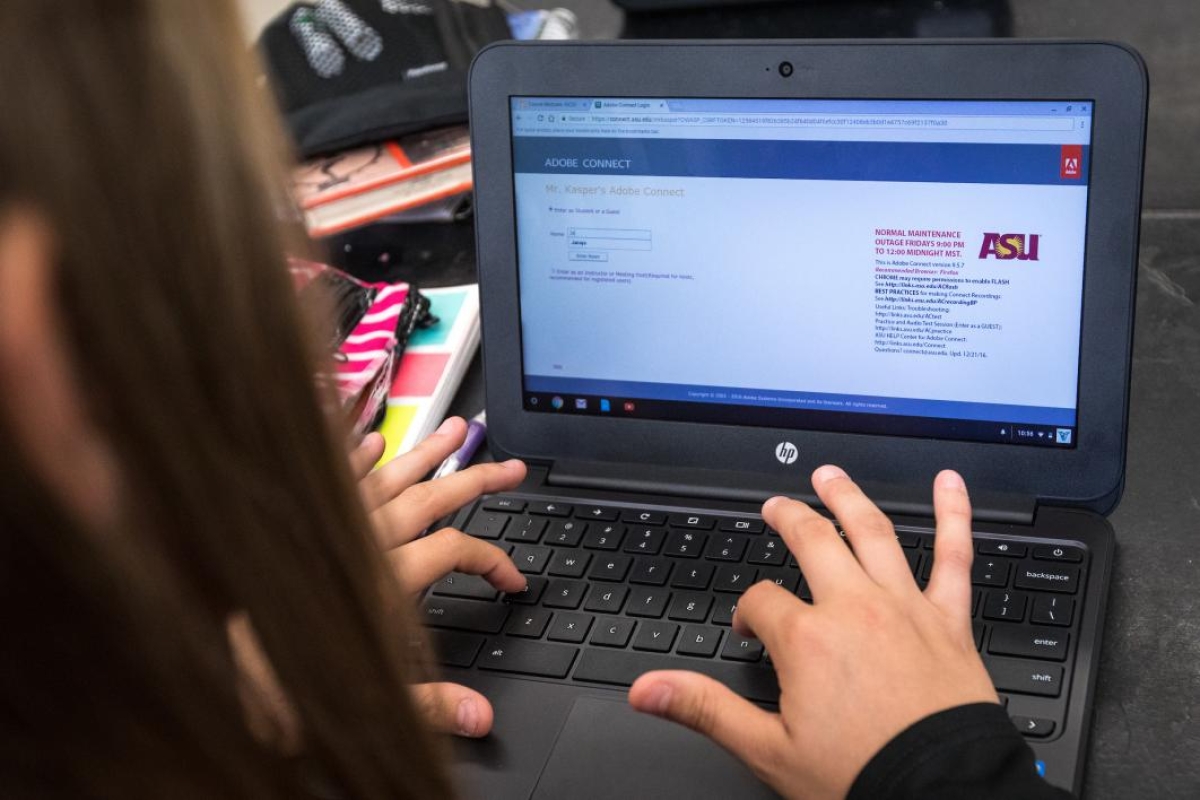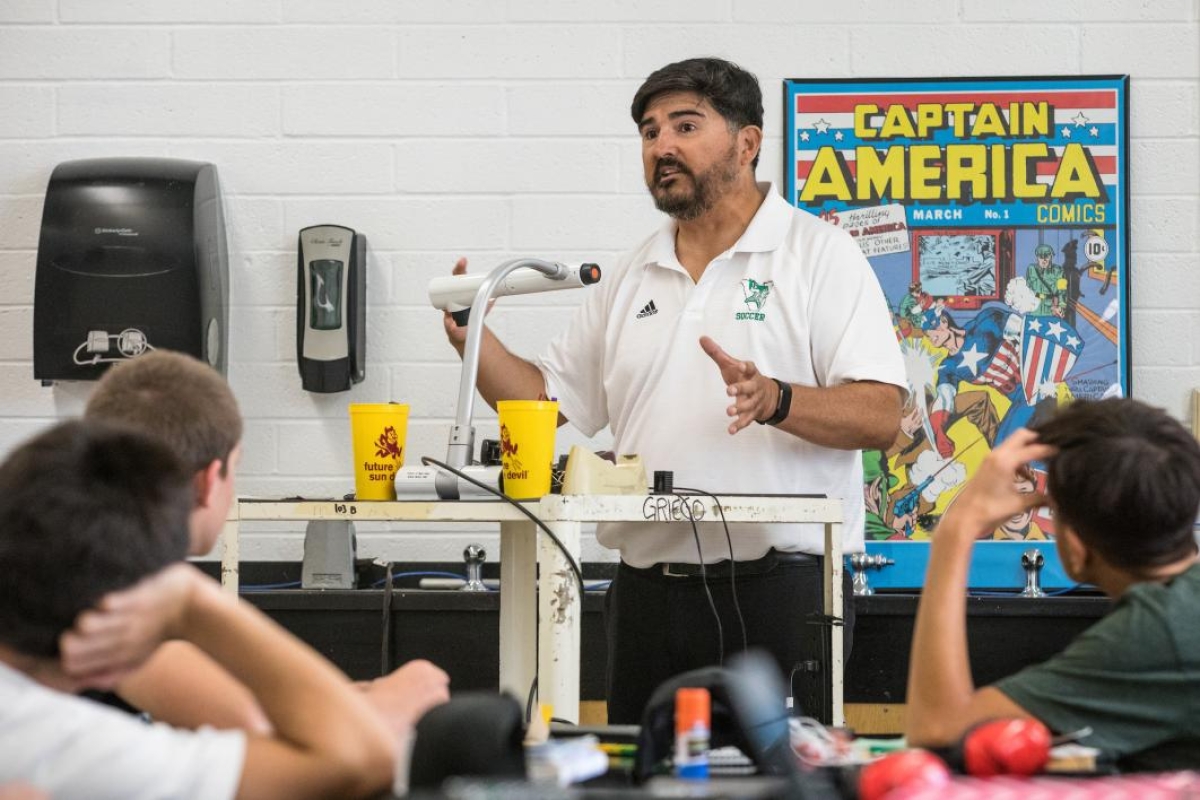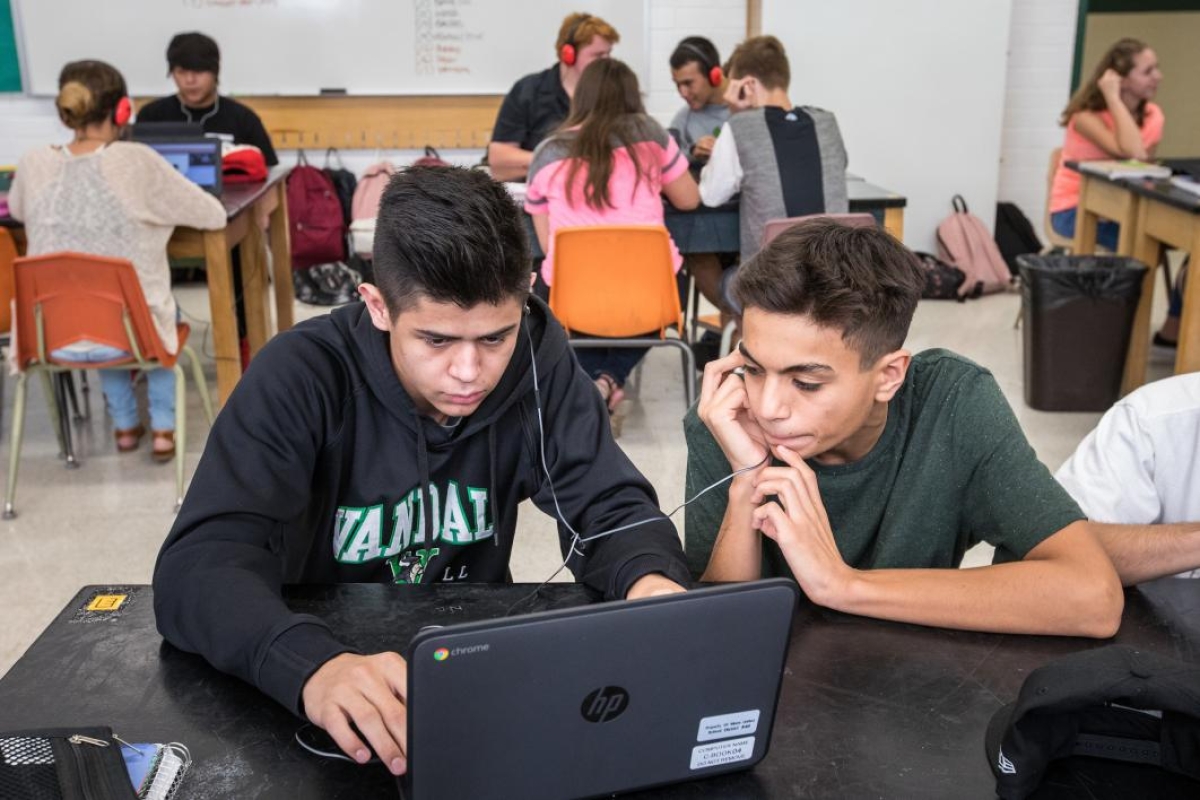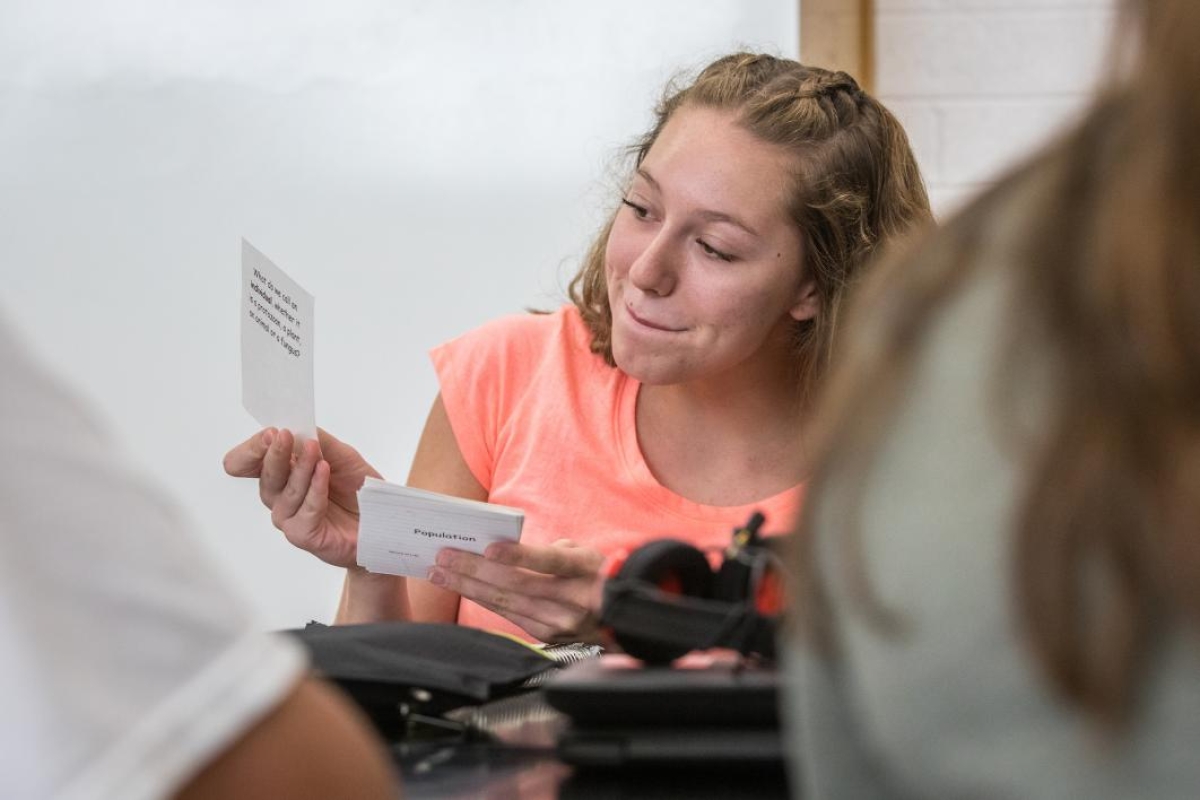Update, fall 2018: After 18 months of ASU Prep Digital’s working with Miami High School, students there on average scored 30-plus points higher on benchmark tests in math and biology.
———
When Miami Junior-Senior High School in eastern Arizona wanted to boost its students’ chances of going to college, it found a partner in the new ASU Prep Digital online program, which is seeking to fill learning gaps in schools around the state and the country.
This school year, about 95 sophomores are taking English and biology using the ASU Prep Digital curriculum while sitting in their Miami classroom with their own school’s teachers.
“Almost all my kids, if they go to college or formal vocational training, they are the first in their family to do so,” said Glen Lineberry, the principal.
“So that postsecondary training is like a cliff and we’re trying to build a ramp up to it.”
Arizona State University is blurring the line between high school and college with ASU Prep Digital, a new program that is offered in two ways — as an a la carte offering to boost curriculum in partnership with existing schools, and as a full- or part-time online charter school that can accelerate the time it takes for students to earn a degree.
“We’re here to impact national college attainment and help students prep for college, prep for careers and prep for life,” said Amy McGrath, chief operating officer for ASU Prep Digital.
“That doesn’t just happen when you turn 18 and come to ASU. ASU can help you do that when you’re in ninth grade and someplace where you don’t have access.”
Miami, a small mining town about 70 miles east of Phoenix, has struggled with unemployment and poverty, and the junior-senior high school was underperforming. About four years ago, the district launched a new initiative called “There’s no D in Miami” to increase achievement and help pave the way for students to go to college. Lineberry said that the faculty restored upper-level courses like physics and the school added a career and technical education program, which students are required to complete for graduation.
Partnerships have been key. The school joined forces with Northland Pioneer and Prescott colleges for juniors and seniors to take courses that earn college credit.
“But in order to have students do college work as juniors, we needed to step up the level for freshmen and sophomores, so ASU Prep Digital is helping us to do that,” Lineberry said of the blended-learning model.
The district decided to make the investment in the ASU Prep Digital classes, which use the Cambridge International Curriculum, a rigorous and popular qualification system around the world. The teachers in Miami have been able to tweak the content as needed, for example, adding a lesson in lab safety that’s customized to the school.
“We’re getting great curriculum, and the kids are engaged and we think it’s a key part of getting the kids ready for college,” said Lineberry, who added that he would like to expand the offering next year.
ASU is connecting with the Miami students in other ways as well. Parents can take advantage of the American Dream Academy, an eight-week program for families to increase achievement and prepare for college. The Mary Lou Fulton Teachers College is working with students who have expressed interest in becoming teachers, helping them with the application process.
“Part of the reason we’re trying to do this is because in 2012, a study came out that found that most high school teachers actually teach within 40 miles from where they went to high school. So we’re trying to recruit locally,” said Nancy Perry, associate dean for the Office of Grants and Partnerships and a clinical associate professor in the Mary Lou Fulton Teachers College.
And Mary Lou Fulton Teachers College student-teachers in Miami will learn how to educate in a blended-learning environment.
“We have many teachers around the state who are trying to be trained in that now, so our partnership is cutting-edge,” Perry said.
Miami is the first blended-learning partner with ASU Prep Digital, which a month after rolling out has 1,500 students in its digital high school, mostly from Arizona but also in 11 other states and China. ASU Prep Digital joins the network of ASU Preparatory Academies, which include campuses in Casa Grande, Mesa, downtown Phoenix and — also new this year — ASU Prep Tempe, on the campus of Compadre High School.
The online classes use the Cambridge International Curriculum as an add-on feature, and students can opt out of the Cambridge components, according to Julie Young, deputy vice president and CEO of ASU Prep Digital. Students can potentially earn college credit by scoring proficiently on the Cambridge end-of-course exams.
ASU Prep Digital offers the core high school classes, as well as Latin, Arabic, entrepreneurship and leadership. Students also can take college courses such as sustainability, criminal justice and modern social problems at a reduced tuition rate.
“I like that the courses are online and I can work on them at other places rather than just at school, anytime I want,” said Riley Guthrey, a sophomore at Miami.
When Young first became involved with digital education in 1996, access to the internet was via dial-up. Now it’s a critical component to lifelong learning.
“We believe that for students to be career, college, and life-ready, they need to know how to learn in this environment,” she said. “When they graduate from high school, whether they decide to become a mechanic, a chef, a real estate agent or a Wall Street banker, they will be continuing their education online. It's a life skill."
Miami Junior Senior High School is holding a kickoff celebration of its new partnerships and academic initiative at 7 p.m. Monday, Sept. 11, in the school gym, 4739 Ragus Road. For more information on ASU Prep Digital, click here.
Top photo: Janaya Sullivan (left) looks at the large monitor at the front of the class as students log into the ASU Prep Digital lesson in biology class at Miami Junior-Senior High School. Photo by Charlie Leight/ASU Now
More Science and technology

ASU in position to accelerate collaboration between space, semiconductor industries
More than 200 academic, business and government leaders in the space industry converged in Tempe March 19–20 for the third annual Arizona Space Summit, a statewide effort designed to elevate…

A spectacular celestial event: Nova explosion in Northern Crown constellation expected within 18 months
Within the next year to 18 months, stargazers around the world will witness a dazzling celestial event as a “new” star appears in the constellation Corona Borealis, also known as the Northern Crown.…

ASU researcher points to fingerprints as a new way to detect drug use
Collecting urine samples, blood or hair are currently the most common ways to detect drug use, but Arizona State University researcher Min Jang may have discovered something better.Fingerprints…


